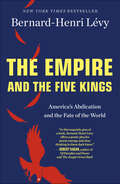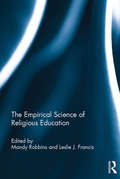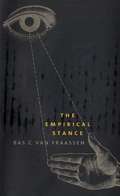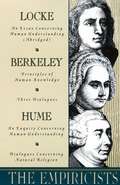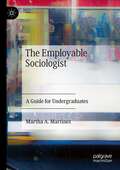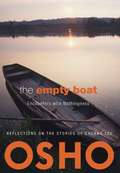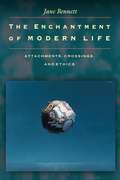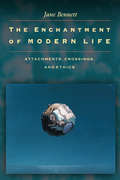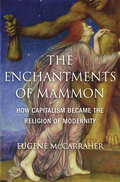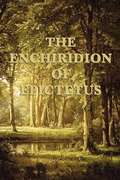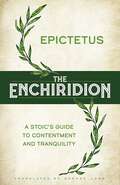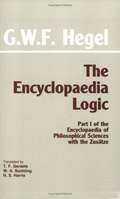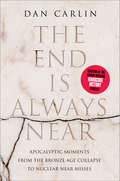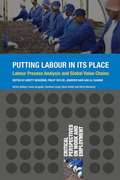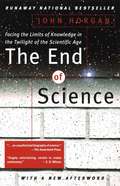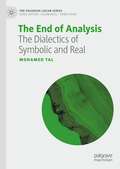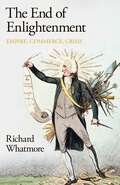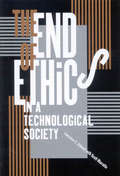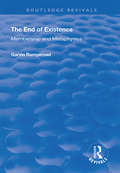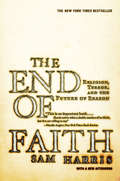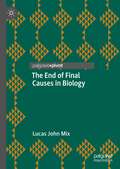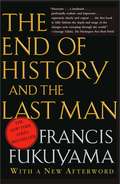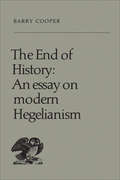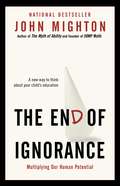- Table View
- List View
The Empire and the Five Kings: America's Abdication and the Fate of the World
by Bernard-Henri LévyOne of the West’s leading intellectuals offers a provocative look at America’s withdrawal from world leadership and the rising powers who seek to fill the vacuum left behind.The United States was once the hope of the world, a beacon of freedom and the defender of liberal democracy. Nations and peoples on all continents looked to America to stand up for the values that created the Western worldand to oppose autocracy and repression. Even when America did not live up to its ideals, it still recognized their importance, at home and abroad.But as Bernard-Henri Lévy lays bare in this powerful and disturbing analysis of the world today, America is retreating from its traditional leadership role, and in its place have come five ambitious powers, former empires eager to assert their primacy and influence. Lévy shows how these five—Russia, China, Turkey, Iran, and Sunni radical Islamism—are taking steps to undermine the liberal values that have been a hallmark of Western civilization.The Empire and the Five Kings is a cri de coeur that draws upon lessons from history and the eternal touchstones of human culture to reveal the stakes facing the West as America retreats from its leadership role, a process that did not begin with Donald Trump's presidency and is not likely to end with him. The crisis is one whose roots can be found as far back as antiquity and whose resolution will require the West to find a new way forward if its principles and values are to survive.As seen on Real Time with Bill Maher (2/22/2019) and Fareed Zakaria GPS (2/17/2019).
The Empirical Science of Religious Education
by Mandy Robbins Leslie J. FrancisThe Empirical Science of Religious Education draws together a collection of innovative articles in the field of religious education which passed the editorial scrutiny of Professor Robert Jackson over the course of his impactful fourteen year career as editor of the British Journal of Religious Education. These articles have made an enormous contribution to the international literature establishing of the empirical science of religious education as a research field. The volume draws together, organises and illustrates the contours of this emerging field and is an essential compendium which covers work in: teacher education and teacher experience; student understanding, attitudes and values; varieties of religious schooling, and; worldview and life interpretation Organised into ten thematic sections the contributors cover the field comprehensively and bring with them an international and reflexive approach to their research. It is an essential resource for those practitioners and researchers who wish to access original and innovative research undertaken by way of ethnographic fieldwork, practitioner research, life-history approaches to research, psychological scales and measures, and large surveys. Particularly interested readers will be studying PGCE and masters level programmes in religious education, as well as qualified religious educators undertaking continuing professional development.
The Empirical Stance
by Bas C. Van Fraassen"What is empiricism and what could it be? Bas C. van Fraassen, one of the world's foremost contributors to philosophical logic and the philosophy of science, here undertakes a fresh consideration of these questions and offers a program for renewal of the empiricist tradition. The empiricist tradition is not and could not be defined by common doctrines but embodies a certain stance in philosophy, van Fraassen says. This stance is displayed first of all in a searing recurrent critique of metaphysics, and second in a focus on experience that requires a voluntarist view of belief and opinion. "--BOOK JACKET. Title Summary field provided by Blackwell North America, Inc. All Rights Reserved
The Empiricists: Locke: Concerning Human Understanding; Berkeley: Principles of Human Knowledge & 3 Dialogues; Hume: Concerning Human Understanding & Concerning Natural Religio
by David Hume John Locke George BerkeleyThis volume includes the major works of the British Empiricists, philosophers who sought to derive all knowledge from experience. All essays are complete except that of Locke, which Professor Richard Taylor of Brown University has skillfully abridged.
The Employable Sociologist: A Guide for Undergraduates
by Martha A. MartinezThis book addresses a gap in and outside academia: how to help Sociology undergraduates develop skills for career success while maintaining a sociologically rigorous approach. Matching sociological theories, methods, and knowledge with contemporary capitalistic managerial and work practices, it shows how sociology undergraduates are not only employable but have marketable advantages over graduates of other disciplines. A student following the program embodied in this book will actively nurture a strong sociological identity; create a job search plan integrating personal and disciplinary interests, values, and skills; design job application materials that provide the best fit for specific jobs and organizations; and launch a satisfying career path. Beyond an employment guide, it will facilitate the teaching of career development by Sociology faculty; increase students’ ongoing confidence in their potential; and provide a solid foundation for communicating the transformative power of Sociology to employers and managers in the government, business, and non-profit sectors.
The Empty Boat
by Osho Osho International FoundationTalks on the Stories of Chuang Tzu. OSHO revitalises the 300-year-old Taoist message of self-realization through the stories of the Chinese mystic, Chuang Tzu. He speaks about the state of egolessness, "the empty boat"; spontaneity, dreams and wholeness; living life choicelessly and meeting death with the same equanimity . Available in a beautiful new edition, this series overflows with the wisdom of one who has realized the state of egolessness himself.
The Enchantment of Modern Life: Attachments, Crossings, and Ethics
by Jane BennettIt is a commonplace that the modern world cannot be experienced as enchanted--that the very concept of enchantment belongs to past ages of superstition. Jane Bennett challenges that view. She seeks to rehabilitate enchantment, showing not only how it is still possible to experience genuine wonder, but how such experience is crucial to motivating ethical behavior. A creative blend of political theory, philosophy, and literary studies, this book is a powerful and innovative contribution to an emerging interdisciplinary conversation about the deep connections between ethics, aesthetics, and politics. As Bennett describes it, enchantment is a sense of openness to the unusual, the captivating, and the disturbing in everyday life. She guides us through a wide and often surprising range of sources of enchantment, showing that we can still find enchantment in nature, for example, but also in such unexpected places as modern technology, advertising, and even bureaucracy. She then explains how everyday moments of enchantment can be cultivated to build an ethics of generosity, stimulating the emotional energy and honing the perceptual refinement necessary to follow moral codes. Throughout, Bennett draws on thinkers and writers as diverse as Kant, Schiller, Thoreau, Kafka, Marx, Weber, Adorno, and Deleuze. With its range and daring, The Enchantment of Modern Life is a provocative challenge to the centuries-old ''narrative of disenchantment,'' one that presents a new ''alter-tale'' that discloses our profound attachment to the human and nonhuman world.
The Enchantment of Modern Life: Attachments, Crossings, and Ethics
by Jane BennettIt is a commonplace that the modern world cannot be experienced as enchanted--that the very concept of enchantment belongs to past ages of superstition. Jane Bennett challenges that view. She seeks to rehabilitate enchantment, showing not only how it is still possible to experience genuine wonder, but how such experience is crucial to motivating ethical behavior. A creative blend of political theory, philosophy, and literary studies, this book is a powerful and innovative contribution to an emerging interdisciplinary conversation about the deep connections between ethics, aesthetics, and politics. As Bennett describes it, enchantment is a sense of openness to the unusual, the captivating, and the disturbing in everyday life. She guides us through a wide and often surprising range of sources of enchantment, showing that we can still find enchantment in nature, for example, but also in such unexpected places as modern technology, advertising, and even bureaucracy. She then explains how everyday moments of enchantment can be cultivated to build an ethics of generosity, stimulating the emotional energy and honing the perceptual refinement necessary to follow moral codes. Throughout, Bennett draws on thinkers and writers as diverse as Kant, Schiller, Thoreau, Kafka, Marx, Weber, Adorno, and Deleuze. With its range and daring, The Enchantment of Modern Life is a provocative challenge to the centuries-old ''narrative of disenchantment,'' one that presents a new ''alter-tale'' that discloses our profound attachment to the human and nonhuman world.
The Enchantments of Mammon: How Capitalism Became the Religion of Modernity
by Eugene McCarraherEugene McCarraher challenges the conventional view of capitalism as a force for disenchantment. From Puritan and evangelical valorizations of profit to the heavenly Fordist city, the mystically animated corporation, and the deification of the market, capitalism has hijacked our intrinsic longing for divinity, laying hold to our souls.
The Enchiridion of Epictetus
by EpictetusNo writings of Epictetus himself are really known. His discourses were transcribed and compiled by his pupil Arrian (author of the Anabasis Alexandri). The main work is The Discourses, four books of which have been preserved (out of an original eight). Arrian also compiled a popular digest, entitled the Enchiridion, or Handbook. In a preface to the Discourses, addressed to Lucius Gellius, Arrian states that "whatever I heard him say I used to write down, word for word, as best I could, endeavouring to preserve it as a memorial, for my own future use, of his way of thinking and the frankness of his speech."
The Enchiridion: A Stoic's Guide to Contentment and Tranquility
by EpictetusThis lovely hardcover keepsake offers the timeless precepts of one of the most important Greek Stoic philosophers. Epictetus (ca. 50–ca. 130 CE) was born into slavery and had a permanent physical disability. After attaining his freedom, Epictetus spent his career teaching philosophy and advising a daily regimen of self-examination. His pupil Arrian later collected and published the master’s lecture notes as The Enchiridion, or Manual. Full of practical advice, this volume offers guidance for those seeking contentment, happiness, and tranquility in the modern world. Through the principles found in The Enchiridion, we learn that true freedom can be achieved by taking control of our thoughts and actions through self-awareness rather than trying to change events beyond our power. This enduring counsel on how to live follows maxims that have set generations of readers on the path to happiness and makes a wonderful gift for any occasion.
The Encyclopaedia Logic with the Zusätze: Part I of the Encyclopaedia of Philosophical Sciences
by G. W. F. Hegel W. A. Suchting H. S. Harris T. F. GeraetsThe appearance of this translation is a major event in English-language Hegel studies, for it is more than simply a replacement for Wallace's translation cum paraphrase. Hegel's Prefaces to each of the three editions are translated for the first time into English. There is a very detailed Introduction translating Hegel's German, which serves not only as a guide to the translator's usage but also to Hegel's. Also included are a detailed bilingual annotated glossary, very extensive bibliographic and interpretive notes to Hegel's text (28 pp. ), an Index of References for works cited in the notes, a select Bibliography of recent works on Hegel's logic, and a detailed Index (16 pp. ). The translation is guided by the (correct) principle that rendering Hegel's logical thought clearly and consistently requires rendering his technical terms logically.
The End Is Always Near: Apocalyptic Moments, from the Bronze Age Collapse to Nuclear Near Misses
by Dan CarlinThe creator of the wildly popular award-winning podcast Hardcore History looks at some of the apocalyptic moments from the past as a way to frame the challenges of the future.Do tough times create tougher people? Can humanity handle the power of its weapons without destroying itself? Will human technology or capabilities ever peak or regress? No one knows the answers to such questions, but no one asks them in a more interesting way than Dan Carlin.In The End is Always Near, Dan Carlin looks at questions and historical events that force us to consider what sounds like fantasy; that we might suffer the same fate that all previous eras did. Will our world ever become a ruin for future archaeologists to dig up and explore? The questions themselves are both philosophical and like something out of The Twilight Zone.Combining his trademark mix of storytelling, history and weirdness Dan Carlin connects the past and future in fascinating and colorful ways. At the same time the questions he asks us to consider involve the most important issue imaginable: human survival. From the collapse of the Bronze Age to the challenges of the nuclear era the issue has hung over humanity like a persistent Sword of Damocles.Inspired by his podcast, The End is Always Near challenges the way we look at the past and ourselves. In this absorbing compendium, Carlin embarks on a whole new set of stories and major cliffhangers that will keep readers enthralled. Idiosyncratic and erudite, offbeat yet profound, The End is Always Near examines issues that are rarely presented, and makes the past immediately relevant to our very turbulent present.
The End Of Russian Philosophy
by Alyssa DeblasioThe End of Russian Philosophy describes and evaluates the troubled state of Russian philosophical thought in the post-Soviet decades. The book suggests that in order to revive philosophy as a universal, professional discipline in Russia, it may be necessary for Russian philosophy to first do away with the messianic traditions of the 19th century.
The End Of Science
by John HorganThis provocative bestseller explores the entire scientific landscape through the eyes of the world's leading scholars and sheds light on what the future of science is and what science holds for the future as a civilization. Noam Chomsky, Stephen Hawking, Karl Popper and others give their candid reflections on everything from the implications of chaos theory to the existence of God, challenging some of the most basic assumptions about the world.
The End of Analysis: The Dialectics of Symbolic and Real (The Palgrave Lacan Series)
by Mohamed TalThis book interrogates the “end of analysis” in psychoanalytic thought from Freud to Lacan. It demonstrates that the notions of mourning, renunciation, liquidation of transference, and traversal of fantasy cannot serve as a settlement for the castration complex (i.e., central to neurosis) but are rather prey to the castration complex itself. It shows how psychoanalysis remains incomplete as long as it has not surpassed them as fantasies sustained by psychoanalytic ideology. In other words, it argues that the analytic procedure must pull psychoanalysis out of this therapeutic tradition for it to be complete and to instigate an attempt of its renewal.The book equally revisits Freud’s and Lacan’s underpinnings in the Enlightenment project, in order to formulate the problem of transference on proper dialectical foundations—that is, the mechanism of alienation from Descartes to Hegel, Kierkegaard’s concept of anxiety, as well as the concepts of authority and value in Durkheim, Mauss, and Marx. In doing so, it provides fresh insights that will appeal to practitioners, as well as to scholars of psychoanalysis and philosophy.
The End of Enlightenment: Empire, Commerce, Crisis
by Richard Whatmore'A brilliant and revelatory book about the history of ideas' David Runciman 'Fascinating and important' Ruth Scurr The Enlightenment is popularly seen as the Age of Reason, a key moment in human history when ideals such as freedom, progress, natural rights and constitutional government prevailed. In this radical re-evaluation, historian Richard Whatmore shows why, for many at its centre, the Enlightenment was a profound failure.By the early eighteenth century, hope was widespread that Enlightenment could be coupled with toleration, the progress of commerce and the end of the fanatic wars of religion that were destroying Europe. At its heart was the battle to establish and maintain liberty in free states – and the hope that absolute monarchies such as France and free states like Britain might even subsist together, equally respectful of civil liberties. Yet all of this collapsed when states pursued wealth and empire by means of war. Xenophobia was rife and liberty itself turned fanatic.The End of Enlightenment traces the changing perspectives of economists, philosophers, politicians and polemicists around the world, including figures as diverse as David Hume, Adam Smith, Edmund Burke and Mary Wollstonecraft. They had strived to replace superstition with reason, but witnessed instead terror and revolution, corruption, gross commercial excess and the continued growth of violent colonialism.Returning us to these tumultuous events and ideas, and digging deep into the thought of the men and women who defined their age, Whatmore offers a lucid exploration of disillusion and intellectual transformation, a brilliant meditation on our continued assumptions about the past, and a glimpse of the different ways our world might be structured - especially as the problems addressed at the end of Enlightenment are still with us today.
The End of Ethics in a Technological Society
by Lawrence E. Schmidt Scott MarrattoThey examine established ethical approaches to such urgent contemporary concerns as environmental degradation, nuclear energy, high tech militarism, and fetal genetic testing, showing that the prevailing viewpoint valorizes autonomy above all other goods and considers technological advances as mere extensions of the range of human freedoms. Modern ethics thus fails to take into account the moral intuition that some possibilities in the realm of techno science simply ought not to be pursued.
The End of Ethics in a Technological Society
by Lawrence E. Schmidt Scott MarrattoLawrence Schmidt and Scott Marratto challenge modern liberal ethics, arguing that there is no consistent ethical framework to deal with the long-range negative consequences of certain technological developments They examine established ethical approaches to such urgent contemporary concerns as environmental degradation, nuclear energy, high tech militarism, and fetal genetic testing, showing that the prevailing viewpoint valorizes autonomy above all other goods and considers technological advances as mere extensions of the range of human freedoms. Modern ethics thus fails to take into account the moral intuition that some possibilities in the realm of techno science simply ought not to be pursued. A comprehensive assessment of modern western society's commitment to technological progress, The End of Ethics in a Technological Society presents a convincing argument in favour of a post-liberal approach - one that rejects the ideology of progress, supports caution, and accepts limitation."
The End of Existence: Membership and Metaphysics (Routledge Revivals)
by Garvin RampersadFirst published in 1998, this volume aims to counter the paradoxes of causality and induction as presented by empirical scepticism, though the work is not a dry critique of others' efforts in this area. In order to address these issues, the author presents his instinctive belief in the interconnectedness of the world's elements from a conceptual point of view. The work is not epistemological, but metaphysical and logical, and the assumptions are made in these areas. The principal concept is "membership", which appears in logic, language and metaphysics. Truth, existence and reference are shown to be forms of membership and, as such, invalid concepts. The famous paradoxes stretch from that of the liar to Russell's result from this misconception, which is responsible for the paradoxes of causality and induction.
The End of Faith: Religion, Terror, and the Future of Reason
by Sam Harris"The End of Faith articulates the dangers and absurdities of organized religion so fiercely and so fearlessly that I felt relieved as I read it, vindicated....Harris writes what a sizable number of us think, but few are willing to say."--Natalie Angier, ?New York Times In ?The End of Faith?, Sam Harris delivers a startling analysis of the clash between reason and religion in the modern world. He offers a vivid, historical tour of our willingness to suspend reason in favor of religious beliefs--even when these beliefs inspire the worst human atrocities. While warning against the encroachment of organized religion into world politics, Harris draws on insights from neuroscience, philosophy, and Eastern mysticism to deliver a call for a truly modern foundation for ethics and spirituality that is both secular and humanistic. Winner of the 2005 PEN/Martha Albrand Award for Nonfiction.
The End of Final Causes in Biology
by Lucas John MixThis book provides a straightforward introduction to teleology in biology, the work it did and the work it can do. Informed by history and philosophy, it focuses on scientific concerns. Seventeenth, eighteenth, and nineteenth century biologists proposed a menagerie of biological “actors” to explain power without appealing to Aristotelian vegetable souls and final causes. Three constraints on teleology narrowed the field, selecting among the various actors as they mutated and recombined. Methodological naturalism, local adaptation, and blind chance each represent a significant philosophical advance in biology. Kant, Darwin, and the Modern Synthesis provided a new teleology, grounded in natural selection, an etiological recursion of form and function, and the details of carbon chemistry on Earth. They naturalized teleology, but they also finalized nature, shifting conceptions about the world and science. Understanding these links – historical, philosophical, and theoretical – sets the stage for new work moving forward.
The End of History and the Last Man
by Francis FukuyamaEver since its first publication in 1992, The End of History and the Last Manhas provoked controversy and debate. Francis Fukuyama's prescient analysis of religious fundamentalism, politics, scientific progress, ethical codes, and war is as essential for a world fighting fundamentalist terrorists as it was for the end of the Cold War. Now updated with a new afterword, The End of History and the Last Man is a modern classic.
The End of History: An Essay on Modern Hegelianism
by Barry CooperHistory ended, according to Hegel according to Kojève, with the establishment and proliferation in Europe of states organized along Napoleonic lines: rational, bureaucratic, homogenous, atheist. This state lives in some tension with the popular slogan that helped give it birth: Liberty, Equality, Fraternity. But there is now also totalitarianism – the only new kind of regime, according to Arendt, created since the national state. Man is now in charge of nature, technology, and society; much of political life has become a gavotte elaborating the meaning of the Napoleonic model.This interpretation, however opposed it seems to common sense, has been influential, particularly in France where the course of existentialism is unintelligible without taking it into account. Professor Cooper argues that it is inherently plausible and examines the arguments of Hegel and Kojève to reveal its consistency and explanatory power. And he applies it to more contemporary events – the experience of the atomic bomb, the Gulag system of extermination, and the growth of multinational corporations.The work concludes by pulling together the presuppositions and theories of the totalitarian system, the Hegelian version of the Napoleonic state, and our contemporary technological society. Overall, the reader will find here a complete and challenging presentation of how the modern world understands its collective life.
The End of Ignorance: Multiplying Our Human Potential
by John MightonA revolutionary call for a new understanding of how people learn. The End of Ignorance conceives of a world in which no child is left behind -- a world based on the assumption that each child has the potential to be successful in every subject. John Mighton argues that by recognizing the barriers that we have experienced in our own educational development, by identifying the moment that we became disenchanted with a certain subject and forever closed ourselves off to it, we will be able to eliminate these same barriers from standing in the way of our children. A passionate examination of our present education system, The End of Ignorance shows how we all can work together to reinvent the way that we are taught.John Mighton, the author of The Myth of Ability, is the founder of JUMP Math, a system of learning based on the fostering of emergent intelligence. The program has proved so successful an entire class of Grade 3 students, including so-called slow learners, scored over 90% on a Grade 6 math test. A group of British children who had effectively been written off as too unruly responded so enthusiastically and had such impressive results using the JUMP method that the school board has adopted the program. Inspired by the work he has done with thousands of students, Mighton shows us why we must not underestimate how much ground can be covered one small step at a time, and challenges us to re-examine the assumptions underlying current educational theory. He pays attention to how kids pay attention, chronicles what captures their imaginations, and explains why their sense of self-confidence and ability to focus are as important to their academic success at school as the content of their lessons.
